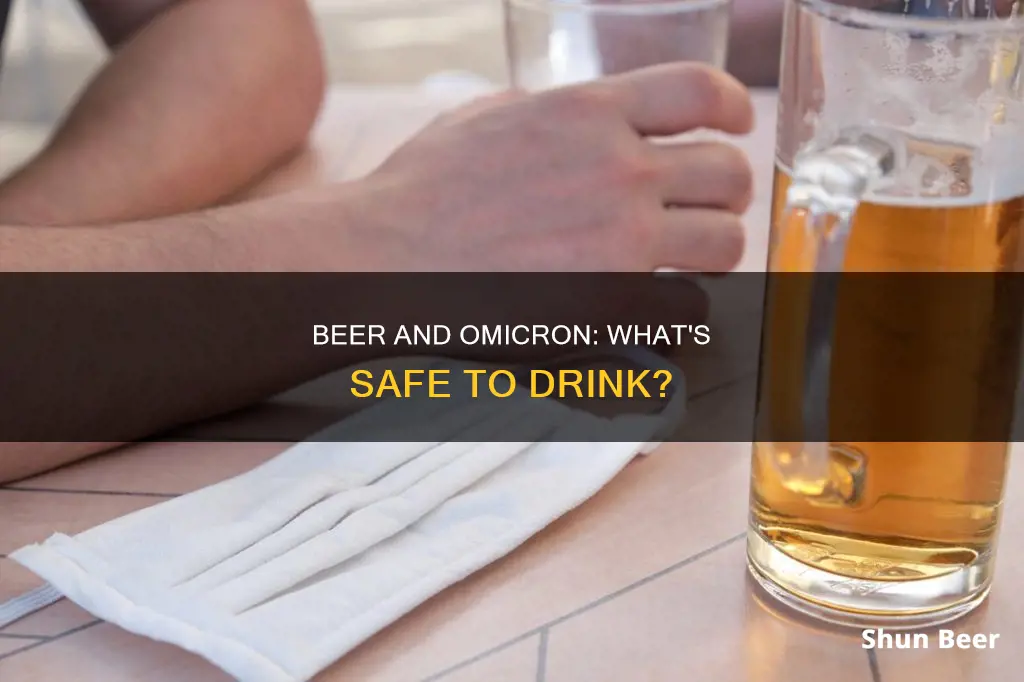
As the Omicron variant of COVID-19 spread, many people wondered if it was safe to drink alcohol after testing positive. While there is no official advice to avoid drinking alcohol after a COVID-19 infection or vaccination, health experts warn that drinking alcohol with COVID-19 or the Omicron variant could worsen symptoms and make the virus harder to fight. Alcohol can cause digestive issues, sleep problems, and impair concentration, which may exacerbate COVID-19 symptoms. It can also weaken the immune system, increasing the risk of acute respiratory distress syndrome (ARDS), one of the most severe complications of the virus.
| Characteristics | Values |
|---|---|
| Alcohol's effect on Omicron | Alcohol weakens the immune system and increases the risk of acute respiratory distress syndrome (ARDS), one of the most severe complications of COVID-19. |
| Alcohol's effect on the body | Alcohol can cause digestive issues, difficulty sleeping, trouble concentrating, and other unpleasant side effects that may worsen Omicron symptoms. |
| Alcohol's effect on long COVID | Alcohol may worsen long COVID symptoms, such as poor sleep and digestive issues. |
| Recommendations | It is not recommended to use alcohol to treat Omicron. People with active alcohol use disorder should not stop drinking without medical supervision. |
What You'll Learn

Drinking alcohol with Omicron may worsen symptoms
As the Omicron variant of Covid-19 spread, many people wondered whether it was safe to drink alcohol after testing positive for the virus. The answer is that drinking alcohol is unlikely to help your recovery from Omicron and may, in fact, make your symptoms worse.
Alcohol and your immune system
The World Health Organisation (WHO) has warned that alcohol use, especially heavy use, weakens the immune system and thus reduces the body's ability to cope with infectious diseases. Alcohol has a "deleterious effect" on your immune system and will not stimulate virus resistance or immunity. Drinking alcohol while you have Omicron may therefore make your body less able to fight the virus.
Alcohol and respiratory distress
Drinking alcohol can increase your risk of developing acute respiratory distress syndrome (ARDS), one of the most severe complications of Covid-19. A 2021 study found that people who drink at least once a week are more likely to develop ARDS during Covid-19 hospitalisation. This may be because alcohol weakens the immune system, making you more prone to infectious diseases.
Alcohol and your throat
Dr Robert G. Lahita, MD, PhD, Director of the Institute for Autoimmune and Rheumatic Disease at Saint Joseph Health, says that drinking alcohol is not a good idea if you have a sore throat, one of the major symptoms of Omicron. "That alcohol is going to burn your throat," he says.
Alcohol and your liver
Research published in the Hepatology Journal found that excessive drinking (such as binge drinking) increased by 21% during the Covid-19 pandemic. The scientists involved in the study estimated that a one-year increase in alcohol consumption during the pandemic will result in 8,000 additional deaths from alcohol-related liver disease, 18,700 cases of liver failure, and 1,000 cases of liver cancer by 2040.
Alcohol and your heart
Heavy alcohol consumption may exacerbate heart problems after having an mRNA Covid-19 vaccine, according to a 2023 review. This could be the case for someone who drinks heavily and is unaware of the early stages of cardiovascular diseases such as myocarditis.
Alcohol and your sleep
Poor sleep can make Omicron worse, and difficulty sleeping is a common side effect of drinking alcohol.
Beer and Kidney Stones: Is Drinking Safe?
You may want to see also

Alcohol can cause digestive issues, trouble sleeping, etc
Alcohol can have a range of negative effects on the body, including causing digestive issues and trouble sleeping.
Digestive Issues
Alcohol can interfere with the structure and function of the gastrointestinal (GI) tract. It can impair the function of the muscles separating the oesophagus from the stomach, leading to heartburn. Alcohol-induced damage to the mucosal lining of the oesophagus also increases the risk of oesophageal cancer. In the stomach, alcohol interferes with gastric acid secretion and the activity of the surrounding muscles. It can also impair muscle movement in the small and large intestines, contributing to diarrhoea. Alcohol inhibits the absorption of nutrients in the small intestine and increases the transport of toxins across the intestinal walls, which can lead to liver damage and other organ damage.
Trouble Sleeping
Alcohol can disrupt sleep patterns and cause insomnia. While it may initially make people feel sleepy, alcohol ultimately has a negative impact on sleep quality. It can cause frequent wakings and fragmented, low-quality sleep. Long-term alcohol use can result in chronic sleep problems and disorders like sleep apnea. It can also interfere with circadian rhythms, affecting the sleep-wake cycle and causing people to feel sleepy during the day.
Beer Diet: Does It Work or Is It a Myth?
You may want to see also

Alcohol can increase the risk of acute respiratory distress syndrome
Alcohol consumption can increase the risk of acute respiratory distress syndrome (ARDS). ARDS is a severe form of acute lung injury that usually develops soon after a major injury or illness. It is characterised by alveolar epithelial and endothelial barrier disruption and intense inflammation, resulting in hypoxemia.
Chronic alcohol abuse is associated with an increased incidence of ARDS. A history of chronic alcohol abuse is associated with an increased risk of developing ARDS, with one study finding that the incidence of ARDS in patients with a history of alcohol abuse was significantly higher (43%) than in patients without such a history (22%). Another study found that a history of significant alcohol consumption (more than two drinks per day) was associated with an increased risk of ARDS development (odds ratio 2.9, 95% CI 1.3-6.2).
Alcohol-induced GSH depletion or oxidation has been linked to impaired functions of alveolar type II cells and alveolar macrophages. GSH is a critical antioxidant that protects against oxidant injury and maintains membrane integrity during a respiratory burst. Alcohol abuse leads to a decrease in GSH levels, making the lungs more vulnerable to oxidative stress and injury.
Additionally, alcohol abuse is associated with a higher incidence of sepsis or pneumonia, resulting in a higher rate of admittance to intensive care, longer inpatient stays, higher healthcare costs, and a 2-4 times greater mortality rate.
Therefore, it is essential to be aware of the risks associated with excessive alcohol consumption, especially when dealing with a vulnerable population at risk of developing ARDS.
Beer at Work: Is It Allowed in Europe?
You may want to see also

Alcohol does not prevent or cure COVID-19
The World Health Organization (WHO) has released a report that states alcohol has a 'deleterious effect' on your immune system and will not stimulate immunity and virus resistance. Drinking alcohol could make your immune system worse at fighting the virus. The WHO report also states that "alcohol use, especially heavy use, weakens the immune system and thus reduces the ability to cope with infectious diseases."
Additionally, excessive alcohol consumption during the COVID-19 pandemic has been linked to an increased risk of liver disease and associated deaths. A study published in the 'Hepatology Journal' found that excessive drinking (such as binge drinking) increased by 21% during the pandemic. The researchers estimated that a one-year increase in alcohol consumption during the pandemic will result in 8,000 additional deaths from alcohol-related liver disease, 18,700 cases of liver failure, and 1,000 cases of liver cancer by 2040.
It is important to note that alcohol can alter your thoughts, judgment, and decision-making behavior, making it harder to adhere to safer gathering practices like wearing a mask and social distancing. Furthermore, sharing drinks directly exposes you to another person's germs through residual saliva.
Therefore, while there may be no official advice to avoid alcohol after a COVID-19 vaccine, it is important to be aware of the potential risks associated with alcohol consumption, especially during a pandemic.
Beer and Tramadol: A Risky Mix?
You may want to see also

Alcohol may cause dehydration
While there is conflicting evidence regarding the dehydrating effects of alcohol, it is generally accepted that alcohol can cause dehydration. This is especially true when consumed in large quantities.
Alcohol is a diuretic, which means it causes your body to remove fluids through your renal system (kidneys, ureters, and bladder) at a faster rate than other liquids. This can lead to a person losing vital fluids and electrolytes, resulting in dehydration. The risk of dehydration is greater when drinking on an empty stomach, as the alcohol enters the bloodstream more quickly. Additionally, large amounts of alcohol can suppress appetite, further increasing the speed of alcohol absorption and dehydration.
To counteract alcohol-induced dehydration, it is recommended to consume alcohol in moderation, drinking slowly, and alternating alcoholic beverages with water or other hydrating drinks. It is also important to be aware of the other negative effects of alcohol on the body, such as impaired cognitive function and damage to the liver, kidneys, and brain.
It is worth noting that drinking alcohol while infected with COVID-19, including the Omicron variant, could worsen the illness. According to the World Health Organization (WHO), alcohol weakens the immune system, reducing the body's ability to fight infectious diseases. Therefore, it is generally advised to avoid drinking alcohol when sick with COVID-19 or any other viral illness.
Invisalign and Beer: Is It Safe?
You may want to see also
Frequently asked questions
Health experts warn that drinking alcohol with COVID-19 or the Omicron variant could worsen symptoms and make the virus worse. Alcohol can cause digestive issues, sleep problems, and concentration issues, among other side effects, which may worsen COVID-19 symptoms.
Dr. Robert G. Lahita, MD, recommends opting for soothing drinks such as shakes, which can increase your calorie intake and provide some protein without irritating your throat. Drinks with high electrolyte content, such as Gatorade, are also recommended to prevent dehydration.
Alcohol has a 'deleterious effect' on your immune system and will not stimulate immunity and virus resistance. Drinking alcohol could make your immune system less effective at fighting the virus. It can also increase your risk of developing acute respiratory distress syndrome (ARDS), one of the most severe complications of COVID-19.







